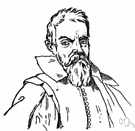Galileo
(ˌɡælɪˈleɪəʊ)n
(Biography) full name Galileo Galilei. 1564–1642, Italian mathematician, astronomer, and physicist. He discovered the isochronism of the pendulum and demonstrated that falling bodies of different weights descend at the same rate. He perfected the refracting telescope, which led to his discovery of Jupiter's satellites, sunspots, and craters on the Earth's moon. He was forced by the Inquisition to recant his support of the Copernican system
Galileo
(ˌɡælɪˈleɪəʊ)n
(Astronautics) a US spacecraft, launched 1989, that entered orbit around Jupiter in late 1995 to study the planet and its major satellites; burned up in the planet's atmosphere in 2003
Collins English Dictionary – Complete and Unabridged, 12th Edition 2014 © HarperCollins Publishers 1991, 1994, 1998, 2000, 2003, 2006, 2007, 2009, 2011, 2014
Gal•i•le•o
(ˌgæl əˈleɪ oʊ, -ˈli oʊ)n.
1. (Galileo Galilei), 1564–1642, Italian physicist and astronomer.
2. a U.S. space probe to Jupiter, launched 1989.
Random House Kernerman Webster's College Dictionary, © 2010 K Dictionaries Ltd. Copyright 2005, 1997, 1991 by Random House, Inc. All rights reserved.
ThesaurusAntonymsRelated WordsSynonymsLegend:
| Noun | 1. |  Galileo - Italian astronomer and mathematician who was the first to use a telescope to study the stars; demonstrated that different weights descend at the same rate; perfected the refracting telescope that enabled him to make many discoveries (1564-1642) Galileo - Italian astronomer and mathematician who was the first to use a telescope to study the stars; demonstrated that different weights descend at the same rate; perfected the refracting telescope that enabled him to make many discoveries (1564-1642) |
Based on WordNet 3.0, Farlex clipart collection. © 2003-2012 Princeton University, Farlex Inc.